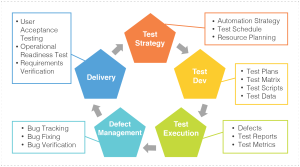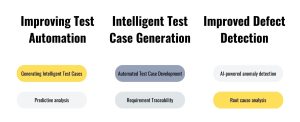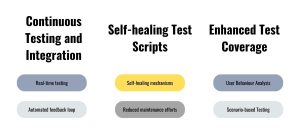QA Process: The Role of AI and ML
Introduction In an ever-evolving technology landscape, quality assurance (QA) process are undergoing significant changes. The advent of artificial intelligence (AI) and machin...

Introduction
In an ever-evolving technology landscape, quality assurance (QA) process are undergoing significant changes. The advent of artificial intelligence (AI) and machine learning (ML) has brought unprecedented capabilities to the QA field, promising greater efficiency, accuracy, and speed. This revolution is changing the way software products are tested, ensuring superior quality and productivity. Let’s take a closer look at how AI and ML are revolutionising the QA process.
Traditional QA Process
Traditional QA process involve manual and automated testing to identify and fix defects in software. Manual testing requires testers to execute test cases without automation tools, which often results in labour-intensive and error-prone procedures. Automated testing, while faster and more reliable, still relies on predefined scripts and lacks the ability to dynamically adapt to new changes in the codebase.

Traditional QA Limits
- Manual effort: requires significant human intervention, resulting in increased costs and potential for human error.
- Static testing scenarios: automated tests are rigid and can break with frequent code changes, requiring constant updates.
- Limited predictive capabilities: cannot anticipate new defects or adapt testing focus based on historical data.
Enter AI and ML in QA process
AI and ML are changing the game in QA. These technologies bring a new level of intelligence to testing processes, enabling more adaptive, predictive, and efficient QA methodologies.
Improving QA process
AI and ML improve QA process by introducing smarter test cases that can learn and adapt. Machine learning algorithms analyse historical testing data to predict potential areas of failure, ensuring that test cases are focused on high-risk areas. This predictive capability reduces the time spent on extensive testing and improves the detection of critical errors.
- Generating Intelligent Test Cases: AI can generate test cases that evolve based on code changes and previous test results. For example, tools like Testim and Functionise use ML to create dynamic, resilient test cases that can self-heal and adapt to new UI changes without manual intervention.
- Predictive analysis: AI models analyse past testing results to identify patterns and predict future defects. This allows teams to proactively address areas that may cause problems, improving the overall quality of the software.
Intelligent Test Case Generation
One of the important tasks in QA process is the creation and maintenance of test cases. AI can automate this process by generating test cases based on user stories, requirements, and code changes. This not only speeds up the testing process but also ensures that all aspects of the software are thoroughly tested.
- Automated Test Case Development: Tools like Appvance IQ and TestCraft use AI to automatically develop test cases. These tools can understand user requirements and translate them into comprehensive test cases, reducing the workload on QA engineers.
- Requirement Traceability: AI ensures that test cases are up-to-date with the latest requirements, providing better coverage and traceability.
Improved Defect Detection
AI-powered testing tools can detect defects more accurately by studying past defects and understanding the patterns that lead to them. Machine learning models can analyse code changes and predict the likelihood of defects in certain areas, allowing testers to focus their efforts where it matters most. This results in higher defect detection rates and fewer false positives.
- AI-powered anomaly detection: Techniques such as clustering and anomaly detection help identify unusual patterns in software behaviour that may indicate potential defects.
- Root cause analysis: AI tools can perform root cause analysis, pinpointing the exact lines of code that are causing defects, significantly speeding up the debugging process.

Continuous Testing and Integration
In the era of DevOps and continuous integration/continuous deployment (CI/CD), AI and ML play a vital role in enabling continuous testing. These technologies can monitor the software development lifecycle in real-time, automatically running tests and providing developers with instant feedback. This ensures that defects are detected early in the development process, reducing the cost and time associated with fixing them later.
- Real-time testing: AI-powered continuous testing tools like Sauce Labs and BlazeMeter can integrate with CI/CD pipelines to provide real-time feedback on code changes.
- Automated feedback loop: These tools provide a seamless feedback loop where code is continuously tested and verified, resulting in faster, more reliable software releases.
Self-healing Test Scripts
One of the challenges of automated testing is the maintenance of test scripts. Changes in the application can cause test scripts to break, requiring constant updates. AI-powered tools can create self-healing test scripts that automatically adapt to changes in the application. This reduces maintenance overhead and ensures that test automation continues to provide value even as the application evolves.
- Self-healing mechanisms: Tools like Testim and Functionise use self-healing mechanisms where AI algorithms detect changes in the application and update test scripts accordingly.
- Reduced maintenance efforts: This significantly reduces the time and effort required to maintain test automation suites, allowing QA teams to focus on more important testing activities.
Enhanced Test Coverage
AI and ML can analyse large data sets and user behaviour to identify areas that require more extensive testing. This ensures that testing is comprehensive and covers all possible scenarios, including edge cases that may be missed by traditional testing. Enhanced test coverage leads to higher software quality and a better user experience.
- User Behaviour Analysis: AI tools analyse real user data to understand how users interact with the software. This helps in creating more relevant and comprehensive test cases.
- Scenario-based Testing: Machine learning can simulate various user scenarios and identify potential edge cases, ensuring thorough testing.

The Future of QA process with AI and ML
The integration of AI and ML into QA process is still in its early stages, but the potential is huge. As these technologies continue to evolve, we can expect even more sophisticated tools that offer deeper insights and greater automation. The future of QA lies in intelligent systems that not only test software, but also continuously learn and improve the testing process.
Emerging Trends of QA process
- AI-powered test management: Integrating AI into test management tools for smarter testing planning and execution.
- Autonomous testing: Fully autonomous testing systems that require minimal human intervention.
- Predictive quality analytics: Advanced predictive analytics to anticipate potential quality issues and proactively resolve them.
Conclusion
AI and ML are revolutionising QA, making it more efficient, accurate, and adaptive. These technologies are not just improving existing processes, but are also paving the way for new methodologies that will shape the future of software testing. Implementing AI and ML in QA is no longer an option, but a necessity for organisations that want to deliver high-quality software at the speed of innovation.